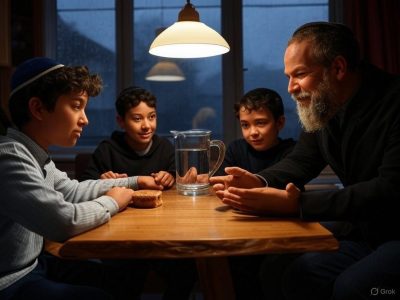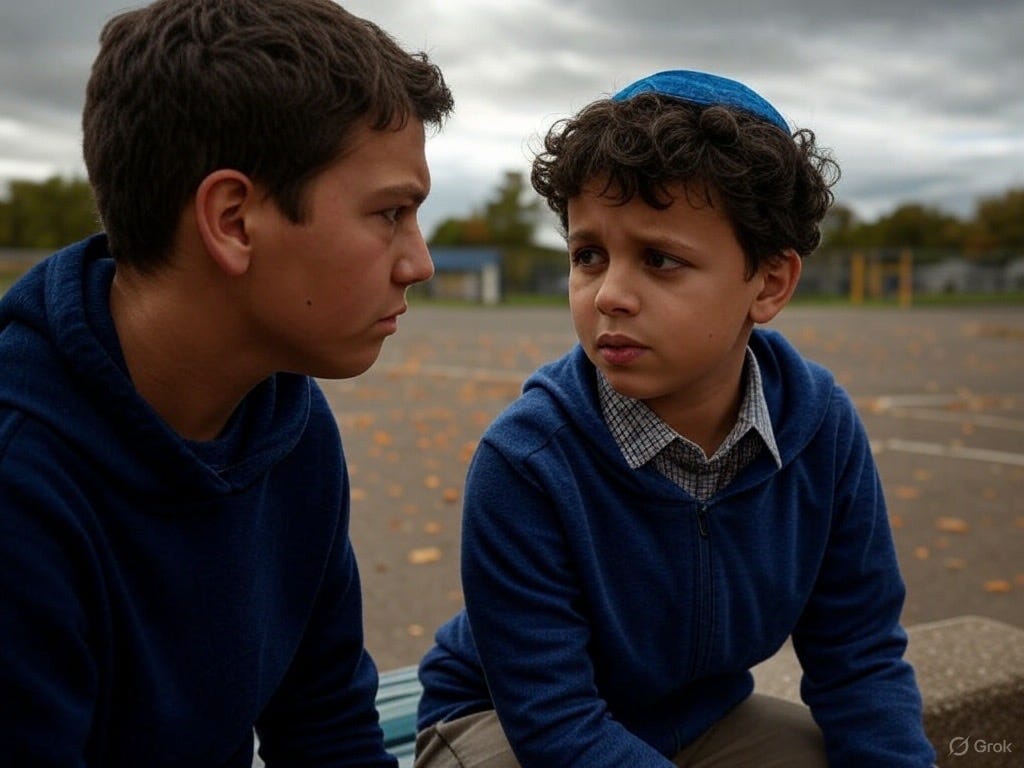Thunder rolled softly in the distance, a low rumble that vibrated through the Cohen family’s cozy kitchen. Rain pattered against the windows, casting flickering shadows across the wooden table where ten-year-old Eli sat, his kippah slightly askew on his dark curls. His plate of kugel sat half-eaten, and his usual chatter was replaced by a furrowed brow and nervous fidgeting with his fork. His parents, Miriam and David, exchanged a worried glance. Something was troubling their son.
“Eli, sweetheart,” Miriam said, setting down a pitcher of water, “you’re quiet tonight. And your kippah’s slipping.” She leaned over, gently adjusting the blue knitted cap to sit snugly on his head. “What’s on your mind? Is it the storm?”
Eli shook his head, his eyes darting to the rain-streaked window, then back to his plate. “It’s…something my friend said at school,” he mumbled. “It’s kind of scary.”
David leaned forward, his warm brown eyes steady despite the distant thunder. “Scary how? You can tell us anything, buddy.”
Eli took a deep breath, his small hands clutching the edge of the table. “My friend…he’s not Jewish…said I have to believe a certain way, or…something really bad will happen to me. Like, forever. He said God only loves people who believe exactly what he believes, and if I don’t, I’ll be…punished. Really punished.” His voice cracked, and he looked down, ashamed to be so shaken.
Miriam’s heart ached. She knelt beside Eli, her hand resting on his arm. “Oh, Eli, that must have felt so heavy to hear. But let’s talk about this. Our tradition as given by the sages, our Torah, has a lot to say about who Hashem is and what He asks of us.”
David nodded, pulling his chair closer. “Your friend’s beliefs are his, but they don’t line up with what we know about Hashem. Let me share something from the Torah that’s always helped me feel closer to God.” He paused, his voice gentle but firm. “In Deuteronomy, it says, ‘You shall love the Lord your God with all your heart, with all your soul, and with all your might’ (Deuteronomy 6:5). That’s what Hashem asks of us…to love Him, to try our best to live with kindness and justice. It’s not about being perfect or believing one exact thing to avoid punishment. It’s about a relationship, like a family.”
Eli’s eyes widened slightly, but he still looked unsure, the thunder outside punctuating his hesitation. “But what if I mess up? My friend said God gets really mad, like He needs…some big sacrifice to forgive you. Like blood or something.”
Miriam’s face softened, though her jaw tightened at the thought of Eli carrying such a fear. “Eli, that’s not how Hashem works. The Torah teaches us that God is merciful and wants us to return to Him, not to be afraid of Him demanding some kind of payment. Let me share another verse.” She reached for the small Tanakh on a nearby shelf, flipping to a familiar passage. “In Psalm 51, King David says, ‘For You do not desire sacrifice, or else I would give it; You do not delight in burnt offerings. The offerings of God are a broken spirit, a broken and contrite heart…these, O God, You will not despise’ (Psalm 51:16–17).”
She looked at Eli, her voice steady. “Hashem doesn’t want blood…animal or otherwise…to forgive us. He wants our hearts. When we make mistakes, we say we’re sorry, we try to fix things, and we grow. That’s *teshuvah*, returning to the right path. God loves that more than anything.”
Eli’s shoulders relaxed a little, but his brow furrowed again, a new question forming. “But…if Hashem doesn’t want sacrifices like my friend said, why do we pray for the Temple to come back? Don’t we say in services that we want it rebuilt? I thought that was about offerings.”
Miriam paused, her hand still on Eli’s arm. She glanced toward the doorway, where Rabbi Yosef Levine had just entered quietly, carrying a basket of fresh challah for the family’s upcoming Shabbat. The rabbi, with his kind eyes and neatly trimmed beard, had been invited for dinner and had overheard Eli’s question. The soft thud of thunder underscored the moment as Miriam caught Rabbi Yosef’s eye, a silent invitation to join the conversation.
Rabbi Yosef set the basket on the counter and approached the table, his presence as calming as a steady flame against the stormy evening. “Eli, that’s a fantastic question,” he said, pulling up a chair. “Mind if I jump in? I heard what you asked, and it’s something even adults wrestle with.”
Eli nodded eagerly, his curiosity piqued despite the rain drumming harder outside. David smiled, gesturing for the rabbi to continue, while Miriam sat back, grateful for the reinforcement.
Rabbi Yosef leaned toward Eli, his voice gentle but animated. “You’re right that we pray for the rebuilding of the Temple in our prayers, like in the *Amidah*. But let’s talk about what that really means. The Temple wasn’t just about offerings…it was about drawing near to Hashem. The Hebrew word for offering, *korban*, comes from a root that means ‘to come close.’ Every offering was a way to feel closer to God, like bringing a gift to someone you love.”

Eli’s eyes widened. “So…it wasn’t about God being mad and needing blood, like my friend thinks sacrifices are?”
“Not at all,” Rabbi Yosef said, shaking his head. “In fact, most offerings in the Temple weren’t even about sin. The Torah describes different kinds of *korbanot*. Some, like the *chatat* or *asham*, were for unintentional sins…mistakes people made without meaning to. But there were no offerings for intentional sins, because Hashem doesn’t need an offering to forgive us. The Torah says in Exodus 34:6–7 that Hashem is ‘merciful and gracious, slow to anger, and abounding in steadfast love and faithfulness…forgiving iniquity and transgression and sin.’ When we do wrong on purpose, we turn back to Him with *teshuvah*…a sincere apology and effort to do better. That’s what Hashem wants.”
Eli tilted his head, processing as another roll of thunder echoed. “So why did they do offerings at all if God forgives anyway?”
“Good question!” Rabbi Yosef said, his eyes twinkling. “Most offerings were actually about joy and gratitude, not sin. The *shelamim*, or peace offerings, were like a big thank-you to Hashem for blessings…people would eat part of the offering with their families, like a holy barbecue. The *todah*, a thanksgiving offering, was for when someone survived something tough, like an illness or a journey. And during holidays like Passover, the *pesach* offering was about celebrating freedom and community, remembering how Hashem brought us out of Egypt. Your friend might not understand how these offerings worked…maybe he thinks they’re all about blood or punishment like he said about sacrifices, but they’re really about connection and drawing closer to Hashem.”
Eli nodded slowly, his fingers adjusting his kippah as he thought. “But…Passover sounds like it’s about blood, right? The lamb and the blood on the doorposts? My friend said it’s a sacrifice about paying for sins.”
Rabbi Yosef chuckled softly, unfazed by the storm outside. “I can see why that might confuse him. The Passover lamb wasn’t about sin at all. In Exodus 12, the *pesach* offering was a sign of faith and protection when the Israelites were leaving Egypt. The blood on the doorposts marked their homes so the angel of death would pass over them. It was about trusting Hashem and celebrating liberation, not paying for anything. Later, in the Temple, the Passover offering was a way to relive that story and thank Hashem for freedom. It’s a celebration, not a punishment.”
Miriam chimed in, her voice warm. “And while we don’t have the Temple today, we can draw near to Hashem through our service of prayer, mitzvot, and how we treat each other. Like Rabbi Yosef said, it’s about closeness.”
Rabbi Yosef nodded, his expression brightening. “Actually, I have a friend who just participated in a special practice of Temple service…not the real thing, but a way to learn and prepare for when the Temple might return. He studied the rituals of the *kohanim* and practiced bringing a mock *todah*, a thanksgiving offering, to imagine giving thanks to Hashem in that holy space. It was all about feeling that connection, that closeness to God. When we pray for the Temple’s return, we’re praying for a time when we can bring those offerings again…not because Hashem needs them, but because they help us express our gratitude and love in a unique way.”
Eli’s lips curved into a shy smile, the thunder now just a distant murmur. “So…Hashem’s not looking for me to be perfect or to do some big sacrifice like my friend said? He just wants me to try?”
“Exactly,” David said, resting a hand on Eli’s shoulder. “The Torah says in Deuteronomy 30:19, ‘Choose life, that you and your descendants may live.’ Hashem wants you to choose kindness, learning, and love. That’s what makes Him happy.”
Rabbi Yosef nodded. “And your friend? He might see God differently, but that’s his journey. You can share what you know about Hashem’s love and mercy if you want, but you don’t have to carry his fears. Just keep asking questions like this, Eli. That’s how you grow closer to Hashem.”
Eli grinned, his earlier worry washed away like the rain outside. “Okay. That makes sense. Can we read more about the Temple stuff later? It sounds kinda cool.”
“Deal,” Miriam said, squeezing his hand. “And maybe we’ll talk about how we can thank Hashem for all the good things in our lives, like this kugel and Rabbi Yosef’s challah.”
As the family laughed, Rabbi Yosef winked at Eli, and the kitchen glowed with warmth, untouched by the fading storm. The Torah’s words, woven through their conversation, reminded Eli that Hashem’s love was not a test but a gift…one that invited him to draw near, step by curious step, with a heart full of questions and a kippah now firmly in place.


Leave a Reply